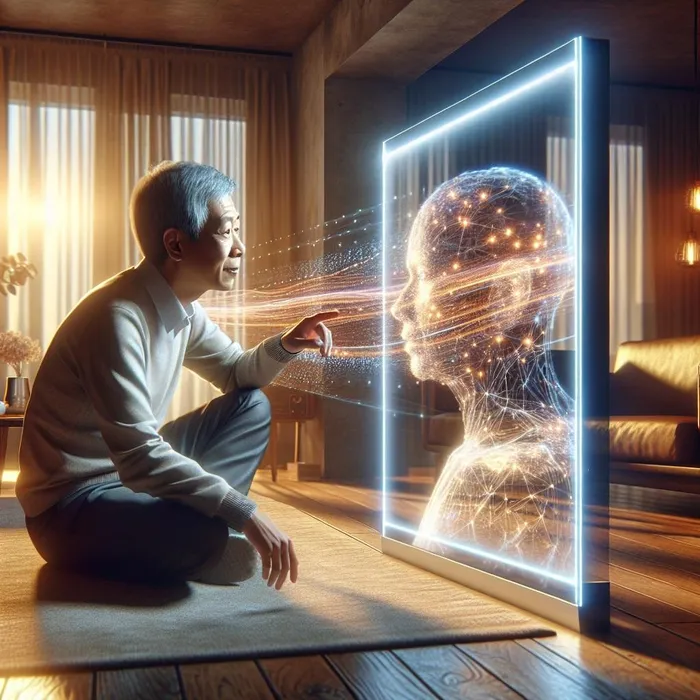The emotional impact of AI: Are we losing human connection?

Generative AI is well embedded in the daily lives of millions, but a shift is underway that deserves closer scrutiny, the author said.
Image: AI LAB
Generative AI is well embedded in the daily lives of millions, but a shift is underway that deserves closer scrutiny. In 2023, most conversations focused on how Gen AI would transform productivity. Streamlining tasks, automating workflows, and accelerating innovation were our bread and butter. But by 2025, the data is telling a different story: the most common use of Gen AI is now personal and emotional support.
This may seem like progress. Technology is stepping in to help people cope with loneliness, anxiety, and the pressures of modern life. But there is a deeper question worth asking: why is there such a widespread need for emotional support in the first place?
Covid-19 lockdowns left more than an economic and health legacy. Those seismic months fundamentally changed how we interact, work, and connect with one another. The norms established during lockdowns have persisted and, in many cases, deepened. Physical communities have thinned, and social interaction has increasingly shifted online. Those temporary behaviours intended to keep us safe have contributed to a new and more permanent kind of isolation.
Now, instead of rebuilding human connection, machines are becoming our companions and confidants. This is a turning point and it’s not a healthy one.
At iqbusiness, we’ve seen firsthand how Gen AI can empower teams and drive operational gains. These are tangible, valuable applications that no modern business can do without. But leaders cannot ignore the parallel trend unfolding before us: Gen AI is stepping in where human connection is faltering, and that is what needs mending.
In recent analysis of the use cases of Gen AI in Harvard Business Review, Marc Zao-Sanders revealed that the top 10 most widespread uses have shown a significant shift between 2024 and 2025. In 2024, ‘Generating ideas’ was number one (now down to number 6) but has been replaced by ‘Therapy / companionship’ (up from two in 2024).
Top 6 Gen AI uses
1 Therapy / companionship
AI-powered tools are helping people manage stress, depression, and emotional regulation. But this surge signals something more: a deep deficit in human relationships. Leaders in businesses, government, schools, places of worship and communities need to take this moment seriously and not lose sight of what – and who – is at stake in the digital revolution.
2 Organising my life (new entrant)
Many people are using Gen AI tools to track, motivate and organise their goals or tasks to enhance efficiencies and accountability. But in practice, this often results in fewer opportunities for collaboration and moments for professional assistance and insights.
3 Finding purpose (new entrant)
Humans have sought purpose since time immemorial, and Gen AI has not changed that. The wise would heed the words of Holocaust survivor Viktor Frankl: “Everything can be taken from a man but one thing: the last of the human freedoms - to choose one's attitude in any given set of circumstances, to choose one's own way.” Are we choosing our own way or allowing tech to make the choices for us?
4 Enhanced learning
AI tutors and adaptive learning platforms make education and learning more personal and accessible for those online. But without mentors or community engagement, much of the learning lacks context and lived insight, and many essential inter-personal skills necessary to grow and succeed are being lost.
5 Generating code for professionals
Gen AI is widely used by designers and product teams to jumpstart ideation, and developers lean on AI co-pilots to write and debug code. This is where Gen AI can have immense and sustainable value. It's efficient, but as reliance increases, deep skills may diminish as we reward speed over exploration and novelty over authenticity.
6. Generating ideas
We’ve moved quickly from our suspicion of Gen AI just two years ago to everyday use in almost every personal and professional setting. It’s use for prompting ideas has dropped from one to six this year as it’s overtaken by more alarming uses.
Other uses in the 2025 top ten are: Fun and nonsense, Improving code for pros, Creativity and Healthier living .
Why does this matter now?
The data clearly shows that humans are not only using technology more, but we are asking it to step into roles that used to belong to people without fully recognising or appreciating its social consequences. Turning to machines for comfort and connection is more than an efficiency play, and there is a real risk that this shift becomes self-reinforcing.
The more we normalise AI as a substitute for human interaction, the less incentive we have to invest in rebuilding human systems of care, of investing in our families, teams, communities. The erosion of human connection is not happening in isolation.
It is unfolding against a backdrop of deepening global anxiety — from geopolitical tensions and wars to climate crises and economic instability. Symbols like the Doomsday Clock, now just seconds from midnight, reflect not only existential threats but also our collective sense of unease. In such an environment, it is tempting to retreat into the efficiency and predictability of machines. But when artificial intelligence begins to fill the void left by fractured relationships and fatigued institutions, it risks becoming a crutch rather than a catalyst, enabling us to bypass the hard, human work of listening, empathising, and rebuilding trust. The more turbulent the world becomes, the more vital - not expendable - authentic human connection becomes.
Technology can and should play a role in supporting goals, facilitating communication, easing daily pressures, and navigating challenges with seemingly no solution. But it cannot replace the emotional intelligence, empathy, and accountability that come from forging human relationships and connections. These are not “soft” attributes; they are the very foundations healthy societies and resilient economies.
Leaders in government, business and civil society must carefully balance the need to create spaces in our organisations where innovation and technology are embedded, but inherently human, real conversation and connections are prioritised.
The most valuable outcomes of Gen AI won’t come from what it supercedes, but from how it empowers people to do more, feel more, and relate more to one another.

Adam Craker, chief executive of IQBusiness.
Image: Supplied
Adam Craker is CEO at iqbusiness
BUSINESS REPORT